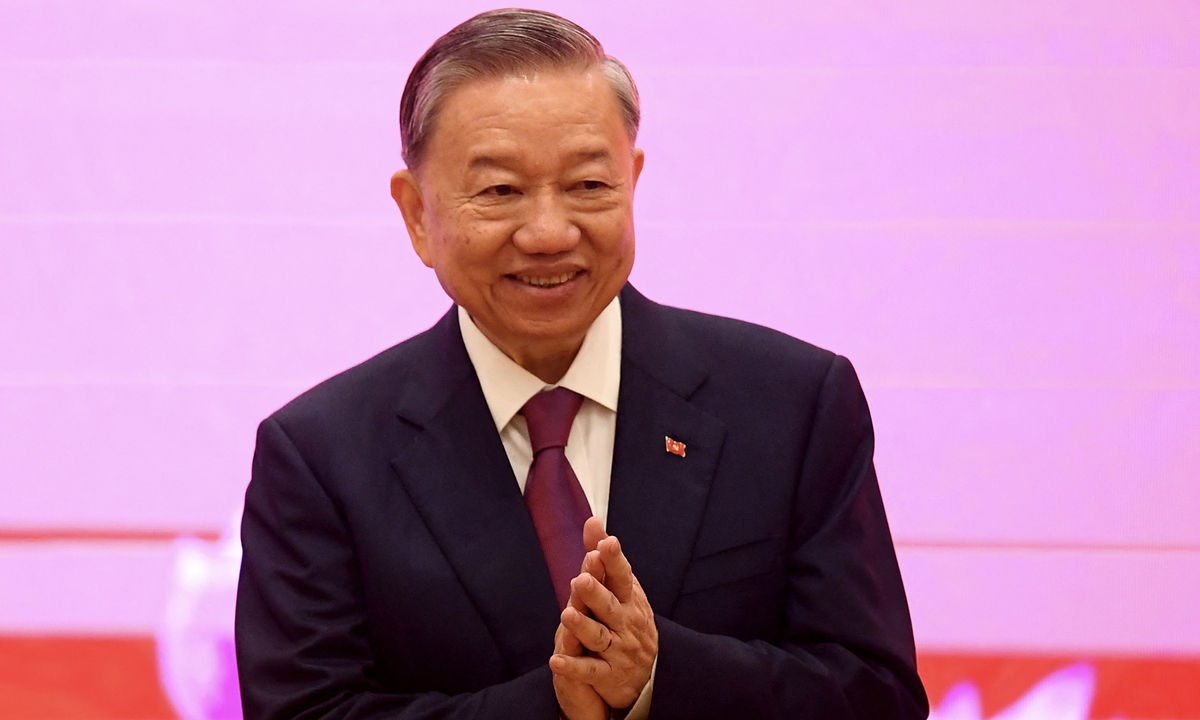
General Secretary of the Communist Party of Vietnam and President To Lam gestures during a press conference at the National Convention Center in Hanoi on August 3, 2024. Photo: AFP
General Secretary of the Communist Party of Vietnam (CPV) Central Committee and Vietnamese President To Lam is paying a state visit to China from August 18 to 20.
After taking office, Lam soon paid a state visit to China, which will be one of the very important main foreign affairs events of the second half of 2024 for Vietnam. President Lam's visit to China reflects Vietnam's consistent diplomatic stance and policy choices, aligning with the fundamental interests of both China and Vietnam. It also contributes to the maintenance of global and regional peace and development.
The China-Vietnam cooperation based on good-neighborliness and friendship has deep foundations. The two countries are close geographically, with intertwined destinies, and their friendly relations date back many centuries. Throughout the revolutionary processes and construction in modern history, the peoples of China and Vietnam have supported and assisted each other. The establishment and the leadership of the CPC and CPV in the revolutionary struggles of their peoples are closely connected. China assisted Vietnam in its struggles against French and US forces, which was significant and is well documented in history and deeply remembered by the Vietnamese people.
Revolutionary leaders between China and Vietnam forged the deep friendship of "comrades and brothers" between the two countries, a true reflection and valuable legacy of China-Vietnam relations. President Lam's visit to China has a deep and solid foundation and will also promote new progress in China-Vietnam relations.
Building the China-Vietnam community with a shared future is a strategic consensus between both leaders. Since embarking on the paths of reform and opening-up, especially since the 1990s, the relationship between the two Parties and the two countries has continuously improved and developed. Based on the intensive development of the comprehensive strategic cooperative partnership between China and Vietnam, in December 2023, President Xi Jinping visited Vietnam and reached an agreement with then-Vietnamese leader Nguyen Phu Trong to jointly build a China-Vietnam community with a shared future that carries strategic significance. The two sides issued a joint statement, marking the beginning of a new phase in the development of China-Vietnam relations.
China and Vietnam are both on the road of building modernization, vigorously developing their economies and pursuing their respective centennial goals. Against the backdrop of the complex evolution of the world and regional patterns as well as the need to cope with many uncertainties, Lam chose now to visit China to plan the future of bilateral relations with Chinese leaders.
This will further promote the construction of a China-Vietnam community with a shared future that carries strategic significance, deepening practical cooperation in various fields. This is a historical and practical choice for the development of China-Vietnam relations, which is related to the fundamental interests and well-being of the two countries' peoples, as well as the cause of modernization that the CPV is relentlessly pursuing.
In 2021, Trong proposed creating a new pattern for Vietnam's foreign policy, namely "bamboo diplomacy." This strategy aims to create a favorable external environment for Vietnam's goal of building a socialist-oriented developed nation by the mid-21st century. President Lam is expected to continue adhering to the diplomatic path set by the 13th National Congress of the CPV and to further promote the "bamboo diplomacy" strategy initiated by Trong.
An important feature of Vietnam's "bamboo diplomacy" is maintaining a balanced strategy among major powers in the context of international integration. Although President Lam took office not long ago, we have already seen Vietnam's good performance of showing balance in diplomatic interactions with major powers such as China, the US and Russia.
The fact that Lam chose China as his first overseas visit destination since taking office is a sign that Vietnam attaches great importance to its relations with China.
But at the same time, judging from experience, the country is not going to give the US the cold shoulder. The US has already made diplomatic moves by sending US Secretary of State Antony Blinken to Trong's funeral in late July. President Lam is likely to meet with the US leader at future international occasions, further advancing Vietnam's comprehensive strategic partnership with the US.
The author is director of the Institute for Vietnam Studies at the Zhengzhou University. opinion@globaltimes.com.cn




